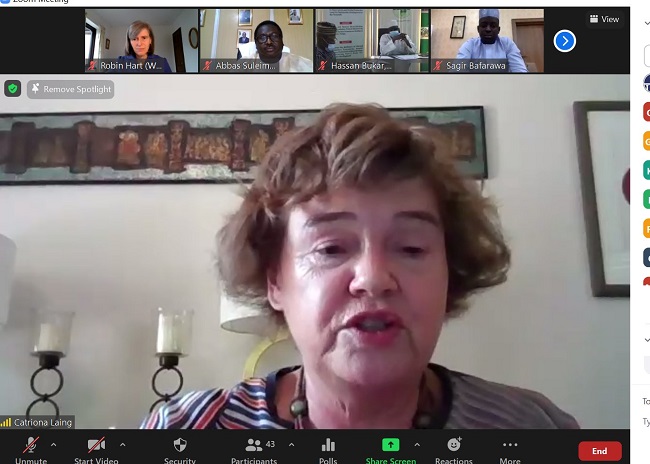The relevance of nature-based solutions for building resilience to climate change were examined from varying perspectives at a two-day virtual forum from February 18 to 19, 2021.

Over 100 participants from Federal and State Governments, civil society groups and international development partners participated in the dialogue on: “Nigeria for Nature”. It was hosted by the British High Commission in Nigeria, in collaboration with Wilton Park.
Themed: “Re-imagining nature-based solutions in Nigeria”, the forum was hosted as part of efforts to sensitise the general public on the benefits of a healthy ecosystems, which underpins global food and nutrition security, and can directly improve livelihoods for millions in Nigeria, including citizens that are highly vulnerable to the impacts of climate change.
Discussions likewise explored the major challenges around the implementation, governance and financing of nature-based solutions and how to overcome them. The meeting also examined how various stakeholders can work together for successful, sustainable nature-based solutions in Nigeria.
Key takeaways from the dialogue include: the need for better monitoring of protected areas; critical role of traditional leaders and women’s groups in ecosystem restoration; expansion of clean cooking to reduce deforestation; scaling-up education and sensitisation on the environment; private-sector engagement for sustainable management of nature; explicitly linking Nigeria’s Nationally Determined Contribution (NDC) and nature; and the centrality of sustainable livelihoods to nature-based solutions.
Nigeria has been very forward leaning on nature-based solutions to climate change joining the Global Ocean Alliance and the Commonwealth Clean Ocean Alliance in 2019 and signing the Leaders Pledge for Nature in 2020. President Buhari made a statement of high ambition at the Biodiversity Summit in September 2020 setting out a range of measures he wished to introduce, such as the establishment of two Marine Protected Areas (MPAs).
However, more innovation and cooperation are required in transitioning to sustainable agriculture and land-use, improving ocean resilience and coastal sustainability, and scaling-up other existing initiatives and mechanisms, including those recognised under the Paris Agreement. The ambition of this conference was to explore how to take these actions to the next level.
The introductory session on the first day included remarks from Catriona Laing, British High Commissioner to Nigeria; a video welcome from Lord Zac Goldsmith, the Minister of State for Pacific and the Environment, Foreign, Commonwealth and Development Office, London; and an opening presentation on “Natural climate solutions as a critical contribution to climate mitigation in Nigeria” by Dr Mohammad Mahmood Abubakar, the Minister of Environment. Sir Nicholas Kay, UK COP26 Regional Ambassador for sub-Saharan Africa, gave the closing remarks for the dialogue on both days.
“The Dasgupta Review of the Economics of Biodiversity”, which was launched on February 2, 2021, was highlighted by several speakers. The Review calls for urgent changes in how all societal actors “think, act and measure economic success” to protect and restore natural capital, and use that capital sustainably.
Estimating the total cost globally of subsidies that damage nature to be at least $4 to $6 trillion per year, the Review highlights that subsidies and other nature-negative investments currently far outweigh the financial flows that support nature.
The dialogue provided the opportunity to promote a renewed and scaled-up efforts to halt desertification, deforestation and restore ecosystems, and encourage commitments to adopting nature-based solutions in Nigeria’s policies and programmes, including those delivering Nigeria’s NDC.
In the lead-up to COP26 in November 2021 and beyond, the UK Government will seek to ensure that finance, capacity building and co-operation are available to unlock nature’s potential to help increase ambition for climate mitigation and adaption, and that this is reflected in an enhanced commitment to implementing nature-based solutions at all levels.
Laing said: “2021 is a pivotal year for addressing the interlinked climate and biodiversity crisis. The upcoming Convention of Biodiversity (CBD15) on 17-30 May 2021 and Conference of the Parties (COP26) on 1-12 November 2021 will be seminal moments in the fight against climate change and protecting our natural heritage. These are global efforts, but we must all do more at the national, state and local level to promote nature. And by doing that we protect livelihoods, our health, ourselves.”
Abubakar said: “Nigeria is committed to implementing nature-based solutions at all levels to address environmental challenges that threaten the well-being and resilience of the citizenry, and by extension, sustain and improve livelihoods, thereby brightening the prospect of lifting 100 million Nigerians out of poverty over a 10-year period, as promised by President Muhammadu Buhari. This, no doubt, resonates robustly with our strategic stakeholders and should continue to attract elevated endorsement in the lead up to COP 26 in November 2021 and afterwards.”
